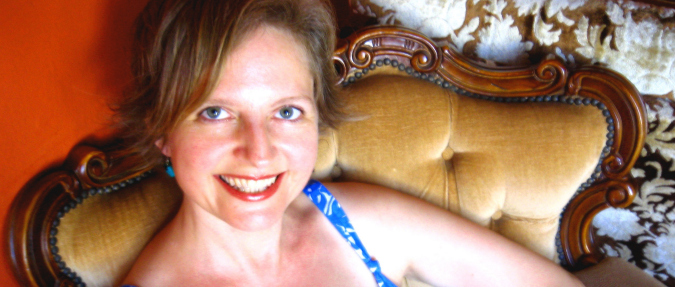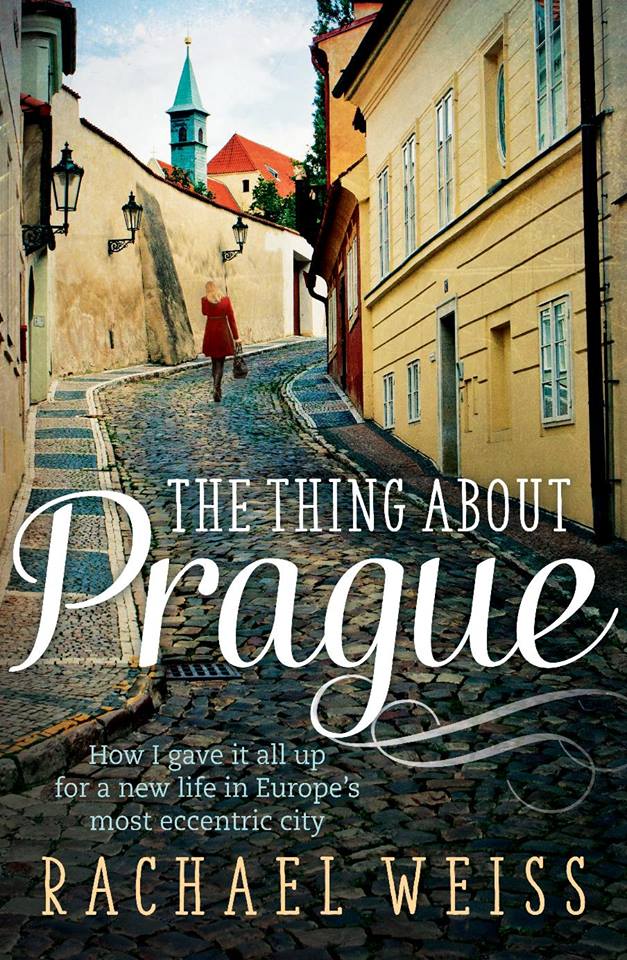If you liked her 2008 memoir, Me, Myself and Prague, then Austarlian author Rachael Weiss’ 2014 follow up, The Thing About Prague is sure to be an enjoyable read. Filled with you-can’t-make-this-stuff-up scenarios that will be all too familiar to Prague’s expat population, it’s also an honest look at the daily challenges and hard-earned rewards of expatriate life in Europe’s “most eccentric” city. We recently chatted with Ms. Weiss in advance of her new book’s release:
This is your second memoir about Prague. How did your experience of the city differ between each of those two books and how have you, the storyteller, changed?
I think the first year I was very much a starry-eyed tourist. I can remember walking through the Old Town in my first few days there thinking, ‘Wow. I live here. I live in this beautiful, ancient bit of Europe. And more than that, I’m from here. Wow.’ I felt very Australian, transplanted into a strange land. By the end of my first year, I had experienced a lot about Prague but I still felt completely outside it, as you do after only one year. You don’t really become part of a place until you’ve gone through several cycles of the same events. That’s why I wanted to go back – to really live there, to become part of the landscape. And indeed the second time around I felt more as though I belonged, and what I was trying to do was belong even more – a job in a Czech company, with Czech friends, getting on top of the language, and so on. I think that’s reflected in the storytelling in the two books. The first is very much about the things you do and see as a tourist – going to Česky Krumlov, what the towers and castles dotted about the countryside look like to an Australian, the food and the beer – and the second is much more about the personal struggle of trying to get a life going in a foreign land.
Throughout The Thing About Prague you struggle to write a novel; but you must have at least been a faithful diarist as your book is filled with wonderful details. Tell us about your writing process – how and where did you write the Prague books?
Writing is always a difficult thing to do. You have to nail your hands to the desk and just do it, if you want to get anything on paper. Living in Prague I was having a hard time and I’m not one to write when suffering. I’m much better at writing when I’m feeling calm and secure. In order to overcome that, I set myself tasks that would keep me writing – I announced a blog so I was forced to produce something at least once a week, and something readable. I wrote letters home regularly, and I made them long and full of stories. I needed those finishing lines to get me to record stories. But it was a bad writing time for me – nothing came out easily, my words felt like hard little stones. So when I left for Sheffield I stopped altogether, thinking perhaps my writing days were over. And then one day I thought, ‘Well do you or don’t you want to write?’ And I did, so I put it all together and this book was the result.

Your author bio says that you now live in Dublin. Can we expect an Irish memoir?
I moved from Sheffield to Dublin just because Sheffield was a bit dull. I liked living right near the Peak District and the countryside was beautiful, but you can’t beat a capital city for living. Dublin is wonderful and strangely like Prague in that it’s a very liveable city. There’s plenty going on but it’s not blighted by skyscrapers and you can walk everywhere. It’s delightful to be in and the Irish love to get out and socialise. I’m keeping notes and yes, I do hope a Dublin book will come out of it.
One of the notable things about your book is the lively cast of characters that will be familiar to our readers: the unscrupulous boss, the sociopathic Expat.cz meet-up, the random friends who, in another place probably wouldn’t be your friends. Will these people recognize themselves or did you change names and incriminating details?
Most people do recognise themselves and so far they tell me they enjoy the experience. And so they should! – I write about them with gratitude and joy. I loved the social life I had in Prague. I loved the strangeness of the life that expat living forces you to lead. The friends I made in Prague have become some of my dearest and will be with me forever. We share this experience that only we have – what it’s like to be an expat in this odd little city. I am enormously grateful for the people I met and the things we did together. Only a couple of people were really awful and I’ve changed those names and places to protect the guilty.
There is a really self-deprecating tone to your book and plenty of comic relief, but at the same time the darker side of expat life (especially the isolation and cultural disconnect) can be glimpsed – I mean you jokingly contemplate suicide at one point! While you left the Czech Republic for reasons other than this, do you think these things would have eventually worn you down?
I do think that the path I was on was going to wear me out eventually. I think it’s a very different experience if you can fashion a good work life for yourself, or even a satisfying family life, but I wasn’t able to do that. My jobs descended one after the other into ever more casualised, dim-witted and underpaid positions. The sense of isolation and cultural disconnect is one all expats experience at one time or another but I know people who have thrived through it – they find it freeing. I think that you only really find it freeing if you have the personal stability of meaningful work and are able to live a relatively comfortable life.
You write about your strong family ties to the Czech Republic with some of your family interred in Terezin and your father being unable to share these details of him family history with you. How much did the mystery of that motivate you to relocate to your ancestral city – twice?
Do you know, weirdly, not at all, or at least not consciously. And yet those deep roots quickly took hold. It wasn’t until I got to Prague and came across letters and photos and started meeting hitherto unknown cousins that I began to really feel the family connection in the Czech Republic. I describe a lot of that in my first book. My father had left just after the war, and then he didn’t go back until the seventies. Additionally, a bitter divorce had ensured I was completely separated from Dad by the time I was twelve. I didn’t see him again until I sought him out at 28. I suppose, thinking about it, that was when my Czechness and my Jewishness began to find expression – when I began to seek out the half of myself that had come from him.
In one memorable passage you write about some workers in your flat looking at you like “If I stand here and complain and look as if it can’t be done she won’t make me”. To me that just says it all! Towards the end you, for good reason, are a little bitter with the country and its inhabitants. What did your Czech audience think of your criticisms?
I do have a Czech audience and they’re pretty enthusiastic. They like having their country written about but they all agree with my criticisms. In fact, that’s the only thing the Czechs who write to me ever say – ‘We are so awful!’ I was pretty bitter for a while after leaving Prague, but then a strange thing happened. I came back to visit friends and as I arrived my heart lifted. I love this city and, even more strangely, I feel at home. I genuinely have a second home in the world – and it’s Prague. And when I think about those plumbers, it’s really with fondness – well, now that I don’t have to rely on them.
The book’s cover blurb calls Prague Europe’s most “eccentric” city. What makes it so? Would you agree that Prague is becoming quite globalized and losing a little of that eccentricity? (I’m thinking of the shuttering of Big Ben Bookshop, which is one of the beloved characters in your book, and a number of other casualties of soaring Old Town rents that are taking some of the city’s charm with them as they go).
I was so sorry to see the end of Big Ben Bookshop, especially as it is indeed a star turn in the book. Prague is getting more and more polished, which is good news for the expats who live here, and bad news for rents but I think Prague has a magic all its own that globalisation is going to have a hard time diminishing. Communism didn’t manage to diminish it, after all. It’s the Czechs – they’re a superb people, really. They’re so very amusing, and they have such a hearty enthusiasm for sex and sly comedy, and cowboy traditions and tea houses; bongos and didgeridoos, and joints and hiking and chatas and beer gardens in the sun. It will take more than a bit of globalisation to kill off Prague’s innate charm and quirkiness.
Which travel memoirs or Prague-based books were you inspired by?
When I was a kid I read and re-read My Family and Other Animals, Gerald Durrell’s story of moving to Greece with his eccentric family. As I write this I realise how that world has stayed in my head. Have I always wanted that adventure, too? You never know what’s really driving you on, but I’d say that book has a lot to do with my urge to live in different places and experience the oddness of other lives. But my hands-down, all-time favourite travel memoir will surprise you. It’s Perfume from Provence by Lady Fortescue. Published in 1935, it is truly the first of its genre. It is charming and gentle and witty and makes you want to move immediately to Provence and start an olive farm. I laughed all the way through and at the end wept buckets. It’s a true hidden gem.
How did you choose the title? What exactly is the thing about Prague?
This title, and the quote from Kafka, ‘Prague never lets you go… this dear little mother has sharp claws’ are brought to you courtesy of Debra Shulkes, the poet who features in the book. What is the thing about Prague? I don’t know and neither did Kafka, but there’s a thing alright, and it never lets you go.
**
Hear Rachael Weiss read from her new memoir at Shakespeare & Sons bookstore, November 29, 3:30pm at the Prague launch for The Thing About Prague; to read more about the author and her work visit rachaelweiss.com.













 Reading time: 9 minutes
Reading time: 9 minutes 


























